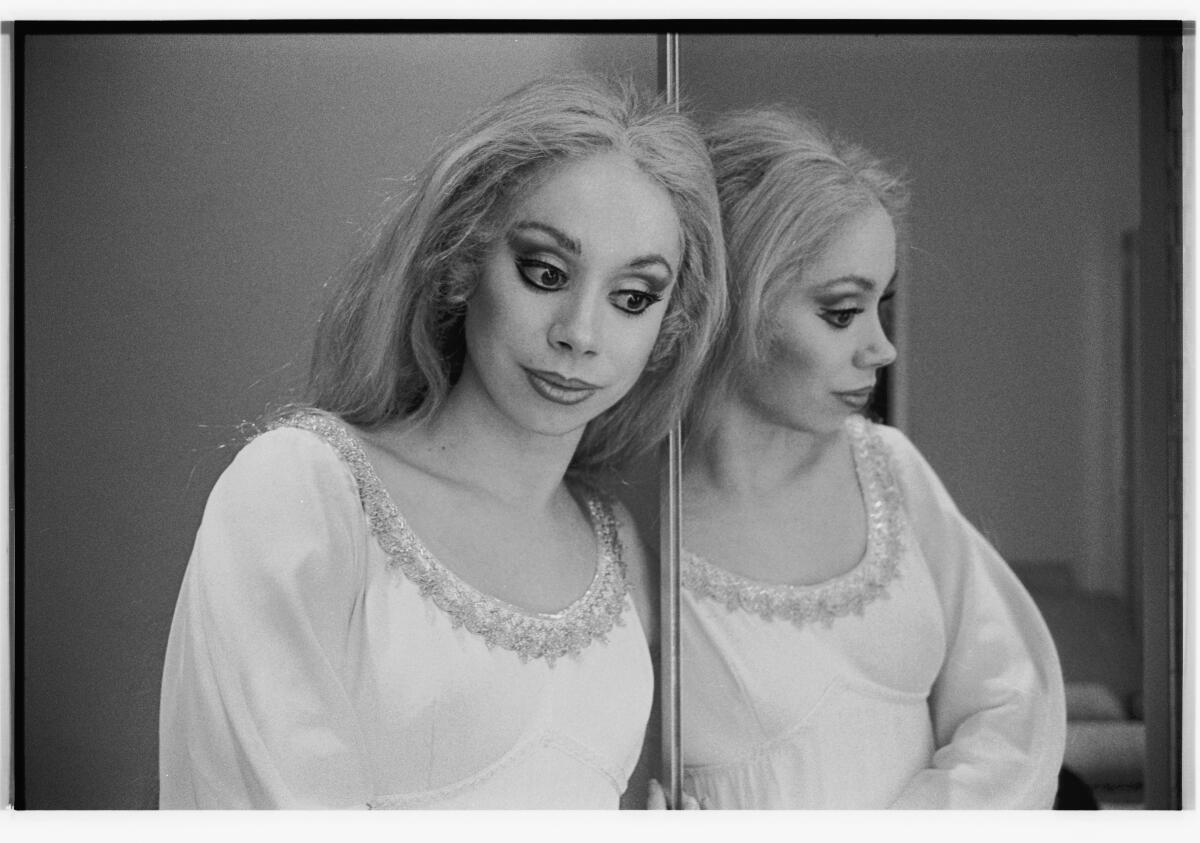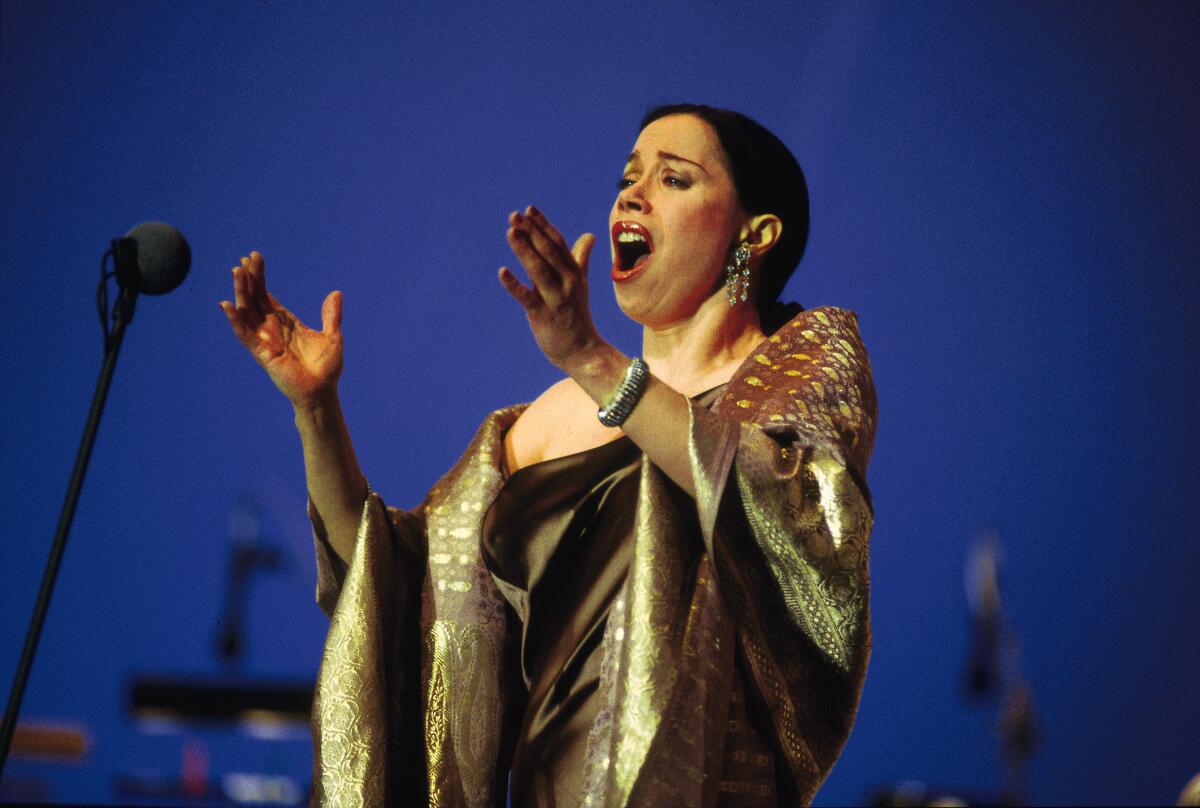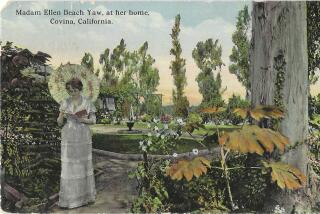The ‘uncompromising’ and versatile opera singer Maria Ewing dies at 71

- Share via
Maria Ewing, a daring and original American mezzo-soprano, known for risk-taking roles and an unwavering dedication to her art, died at home outside Detroit. She was 71.
The cause was cancer, according to a representative for Ewing’s daughter, actress and director Rebecca Hall.
In a career that spanned decades, Ewing became known for her dramatic abilities and vocal versatility. She could sing in as many as eight languages and appeared in a wide range of roles, including “Carmen” and “Salome.” Her take on the latter in Richard Strauss’ eponymous opera is still perhaps her most widely known performance, earning high praise when the show debuted at the Music Center in Los Angeles in 1986.
Ewing took a cue from Oscar Wilde’s original play that Salome should appear nude after “Dance of the Seven Veils.” Where other performers opted for a body stocking, Ewing took the literal route.
Former Times classical music critic Martin Bernheimer found her performance dazzling, describing her as “command[ing] a rather soft, slender and reedy mezzo-soprano that thins out a bit at the extended top.... She gives everything she has, and then some. She phrases thoughtfully, expressively. She colors the text knowingly. She sustains tension in the grand lines, paces herself cannily in the violent outbursts.”

Hall described her mother as “uncompromising” in an email, writing that Ewing found a huge release in music.
“She was fearless in her approach to finding the emotional truth of a piece of music — whatever it was — if it was ugly, scary or brutal she would make sure she would sing it ugly, scary or brutal.”
Critics did not always understand the intensity of Ewing’s devotion and her desire to uncover the sometimes unpleasant heart of a role. In 1986, when she and her then-husband, theater director and Royal Shakespeare founder Peter Hall, staged “Carmen” at the Metropolitan Opera, their production met with unfavorable reviews. A critic for the New York Times wrote, “A more eccentrically sung and acted Carmen has probably never been heard and seen in this opera house than the one delivered by Miss Ewing on this opening night.”
Ewing’s fans remained legion, however, and she was beloved for her volatile, passionate, sometimes unpredictable performances.
Maria Louise Ewing was born in Detroit on March 27, 1950. Her mother was Dutch and her father was African American. Her family’s experience and lineage serves as the inspiration for Hall’s 2021 Netflix film, “Passing,” which centers on the stories of two light-skinned Black women, one of whom passes for white.
Hall tells The Times that Ewing always loved music, and that although her great love was to sing opera, she never really listened to it. Ewing had a special relationship with jazz, Hall said, noting that Ewing sang jazz for a period of time in London, an experience that remained dear to her heart. She also loved live recordings of Frank Sinatra and Judy Garland.
Hall writes that Ewing felt a particular kinship with Garland and that one of her favorite songs was Garland singing “The Man That Got Away.” Other favorites included Claude Debussy’s “Prélude à l’après-midi d’un faune,” Bill Evans playing “Here’s That Rainy Day” and Grover Washington Jr.’s “Passion Flower.”
“When I was a child, we would dance a lot together — it would be Stevie Wonder, Prince, sometimes Whitney Houston, who she also loved,” Hall says. “These are some of my fondest memories. She was utterly herself when she danced.”
Ewing studied at the Cleveland Institute of Music before making her 1976 debut at the Met in Mozart’s “The Marriage of Figaro.” She went on to sing in nearly 100 performances at the Met, and appeared in opera houses and festivals around the world, including La Scala in Milan, Italy, and England’s Glyndebourne Festival, where she met her future husband Peter Hall in 1979.
The pair married in 1982, the same year that daughter Rebecca was born. The couple divorced in 1990.
In a 1992 profile for The Times, Barbara Isenberg described an artist fiercely dedicated to finding the truth in her roles in order to discover the truth about herself, even if the process was uncomfortable at times.
“I do what I believe is right,” Ewing told Isenberg. “If this appears to be risk taking or daring, so be it. The theater is meant to be a place where emotions are unleashed and where one reveals oneself.”
Ewing remains a “dazzling enigma,” Hall says. “She was full of contradictions. But she was wonderfully alive to all of them,” she adds. “She was fiercely passionate, yet also gentle and caring, complicated and yet always loving. She was a sometimes dangerous perfectionist whose dedication to artistic truth knew no bounds.”
In addition to Hall, Ewing is survived by three sisters and a granddaughter.
More to Read
The biggest entertainment stories
Get our big stories about Hollywood, film, television, music, arts, culture and more right in your inbox as soon as they publish.
You may occasionally receive promotional content from the Los Angeles Times.











